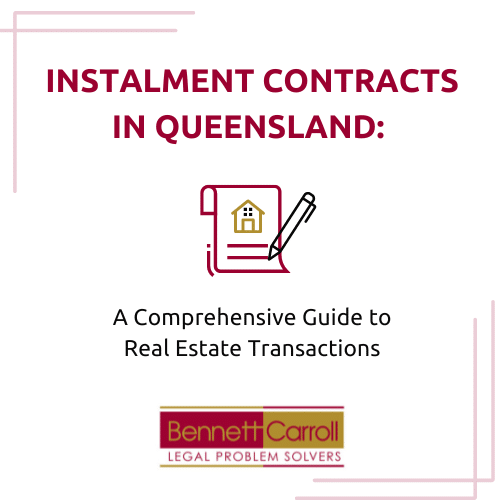An instalment contract is where the purchaser pays via increments and does not usually obtain title until the final payment is made. The Property Law Act 2023 (Qld) has replaced the Property Law Act 1974 (Qld) and reaffirms many of the traditional rules around instalment contracts, while modernising the language and structure of the legislation. For a full overview of the key legal reforms, see our Queensland Property Law Act 2023: Key Legal Reforms Taking Effect From 1 August 2025 article.
Under the 2023 Act, an “instalment contract” is now more precisely defined. If the purchaser is required to pay more than 10% of the purchase price (or 20% for proposed lots under community titles schemes) before obtaining title, the contract will generally be classified as an instalment contract. The updated legislation also makes clear that certain payments described as “non-refundable deposits” can trigger this classification.
Update: This article, originally published on 23 November 2021, has been reviewed and updated as at 10 October 2025 to reflect changes introduced by the Property Law Act 2023 (Qld), which commenced on 1 May 2025, replacing the Property Law Act 1974 (Qld). The Act came into effect on 1 August 2025. To understand how these changes interact with Queensland’s new disclosure laws, read Queensland’s New Property Disclosure Laws: What Every Buyer and Seller Needs to Know from August 2025.
The purchaser’s risks in an instalment contract
In a typical sale of land, the parties – particularly the buyer – will not wish for their contract to be an instalment contract. The major risks for purchasers in an instalment contract stem from the fact that they do not have title to the land until they have completed the instalments. If the vendor becomes bankrupt before the instalments are completed, then the purchaser’s claim to the land will be subject to any pre-existing charges and mortgages over the land. In addition, instalments are non-refundable and therefore a subsequent breach of payment obligations could prevent the purchaser from obtaining not only the property but also the money they have already paid towards the property.
For assistance with your contracts and conveyancing process, see our Conveyancing Services page.
How a regular contract could become an instalment contract
A sale of land contract may inadvertently become an instalment contract where the payments made by the purchaser prior to settlement are no longer considered to be a ‘deposit’ under the Property Law Act. A payment prior to settlement will not be considered a deposit if it is greater than 10% of the purchase price or if it is either expressly or impliedly non-refundable.
To prevent a contract from unintentionally becoming an instalment contract, it is important to ensure that no more than 10% of the purchase price is paid prior to settlement. It is equally important to ensure that the deposit is refundable. The REIQ standard form contract states that the deposit is refundable and stipulates who is entitled to the deposit if the contract terminates for any reason. Parties should avoid inserting special conditions that contradict these standard terms or they risk the contract becoming an instalment contract.
Protections under the Property Law Act
Given the potential risks discussed above, there are a number of legislative protections afforded to purchasers in instalment contracts. Firstly, the seller is unable to mortgage the property without the purchaser’s permission. This prevents the seller from entering into a mortgage, thereby preventing awkwardness or loss to the purchaser if the vendor breaches a mortgage and the bank seizes the property, leaving the purchaser without a remedy.
The purchaser is also entitled (and often encouraged) to lodge a caveat over the property once they have entered into the contract. Having a caveat prevents others from registering an interest on the property and therefore adds a layer of protection from the property being sold while the contract is on foot.
Purchasers in instalment contracts also have the option of demanding conveyance (transfer of title) upon paying a third of the purchase price, in return for the seller obtaining a mortgage over the remaining two thirds of the property. This option can also be exercised by the seller.
Finally, purchasers are afforded a 30 day notice of termination from the seller in the event that the purchaser defaults on an instalment, with the exception of the initial instalment. If the purchaser rectifies their breach within 30 days, then the contract remains on foot as if no breach occurred.
To navigate the complexities of instalment contracts in Queensland seamlessly, reach out to Bennett Carroll Solicitors today. Our experienced team stands ready to provide tailored legal guidance, ensuring your real estate transactions proceed smoothly and securely. Call us on 1300 334 566 or email info@bcglaw.com.au and safeguard your interests every step of the way.
*DANGER* Common issues With Instalment Contracts:
🔴 Don’t lose your money due to an invalid contract! Ensure your agreement is legally sound before you sign. Contact us now!
What’s an instalment contract?
An instalment contract is where the purchaser pays via increments and does not usually obtain title until the final payment is made. The Property Law Act 1974 (Qld) makes special provision for instalments contracts and in many respects treats them differently to standard residential conveyances.
Identifying an instalment contract
If the purchaser is obligated to pay greater than 10% (or 20% for a proposed lot off the plan)[1] of the purchase price without receiving transfer of title then the contract is an instalment contract.
Important features include;
- The vendor cannot mortgage or sell the land
- The purchaser can lodge a caveat to protect their interest in the land
- The vendor cannot rescind the contract for the purchaser’s default in a payment unless a 30-day notice has been issued to the purchaser
- After one-third of the purchase price has been paid, either party can demand a conveyance of title from the other (subject to the purchaser granting a mortgage in favour of the vendor).
- The party seeking the conveyance can’t be in default.
These protections remain under the Property Law Act 2023 (Qld) and are now laid out in clearer statutory language. The Act continues to allow either party to compel conveyance once one-third has been paid, reinforcing the balance of power in these contracts.
Default
As stated above, where the purchaser fails to meet a payment the vendor can issue a notice giving the purchaser 30 days to rectify the breach. Two common mistakes arise following this. First, vendors often give the purchaser notice requiring payment within 7 or 14 days rather than the statutory requirement of 30 days. Second, vendors often misunderstand their rights and will purport to terminate immediately after the purchaser fails to make the payment. This actually results in a breach by the vendor.
Under the 2023 Act, the 30-day notice period remains mandatory for lawful termination by the vendor due to payment default, ensuring consistent protection for purchasers.
Vendor’s reluctance to hand over title
Vendors are often reluctant to hand over title to the purchaser. Indeed they may not be able to do so if there is a mortgage that hasn’t or can’t be paid out. A purchaser faced with a particularly difficult vendor can make an application to the Court to force the vendor to transfer title to the purchaser. This is very costly and the vendor can be fined upwards of $900.00. We always recommend purchasers lodge a caveat to stop the vendor dealing with the property at all until the Court application has settled.
Lodge a caveat
Although a vendor cannot grant a mortgage to a third party, they can grant other kinds of charges (we stress the importance of proper contract drafting here). Purchasers would lodge a caveat communicate to the outside world that they have a legal interest in the property. This defeats most claims from third parties that the vendor granted them some other form of interest.
The 2023 Act continues to allow purchasers in instalment contracts to lodge a caveat, with clearer statutory authority for this protective step.
Stamp duty
Although final payment of the purchase moneys may be years away, stamp duty is due 30 days from the contract date. Significant penalty interest will accrue from this date until payment.
Existing mortgage over the lot
The purchaser should specify in the contract that instalment payments be made to the mortgagee (bank). The consequence of not doing so is that upon final payment being made the vendor’s mortgage may not be paid out and the funds dissipated preventing settlement.
Interest charges
A term in a contract providing that interest is payable where the purchaser fails to meet an instalment payment can be held invalid if not properly drafted. If the right to charge interest arises because the purchaser has granted a mortgage to the vendor, consumer credit legislation can step in to negate that right. Proper contractual drafting is absolutely paramount to ensure these rights are maintained.
Bankruptcy
If the vendor becomes bankrupt or enters external administration (for companies) the purchaser can enforce the contract against the vendor’s trustee, administrator or liquidator. However, the trustee can void the transaction where the purchase price was well below market value.
Taking possession and due diligence
Purchasers typically lose their right to conduct searches and seek compensation or terminate upon taking possession. The contract should take this into account by delaying possession for a few weeks so the purchaser can do their due diligence.
Need a properly drafted instalment contract? Avoid costly mistakes and ensure your agreement is legally sound.
Our experienced team can draft a tailored instalment contract that protects your interests and complies with Queensland law.
Protect your investment today—Call 1300 334 566 for expert legal advice on instalment contracts! 1300 334 566
Legal Update: This article has been updated in July 2025 to incorporate the latest changes from the Property Law Act 2023 (Qld), which replaced the Property Law Act 1974 (Qld). Always seek tailored legal advice to ensure compliance with current legislation.

Navigating instalment contracts under the Property Law Act 2023 (Qld) can be complex. Learn more about our latest property law updates or explore our real estate law services to protect your interests.
Why Choose Us?
✅ 50+ Years of Experience in Queensland Property Law
✅ Fast Turnaround on Contract Reviews
✅ Transparent Pricing – No Hidden Costs
✅ Services Available Across Queensland, In-Person or Online. We have offices in Brisbane, Gold Coast, Sunshine Coast & Ipswich.

- Click to read related articles on real estate law or property transactions.
- Click to learn more about our firm’s real estate services for further assistance.
Other useful websites:








